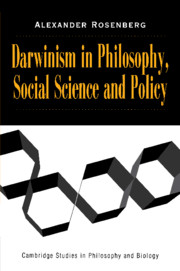Book contents
- Frontmatter
- Contents
- Introduction
- 1 A Field Guide to Recent Species of Naturalism
- 2 Naturalistic Epistemology for Eliminative Materialists
- 3 Limits to Biological Knowledge
- 4 Reductionism Redux: Computing the Embryo
- 5 What Happens to Genetics When Holism Runs Amok?
- 6 The Biological Justification of Ethics: A Best-Case Scenario
- 7 Moral Realism and Social Science
- 8 Contractarianism and the “Trolley” Problem
- 9 Does Evolutionary Theory Give Comfort or Inspiration to Economics?
- 10 The Political Philosophy of Biological Endowments: Some Considerations
- 11 Research Tactics and Economic Strategies: The Case of the Human Genome Project
- Bibliography
- Index
5 - What Happens to Genetics When Holism Runs Amok?
Published online by Cambridge University Press: 06 July 2010
- Frontmatter
- Contents
- Introduction
- 1 A Field Guide to Recent Species of Naturalism
- 2 Naturalistic Epistemology for Eliminative Materialists
- 3 Limits to Biological Knowledge
- 4 Reductionism Redux: Computing the Embryo
- 5 What Happens to Genetics When Holism Runs Amok?
- 6 The Biological Justification of Ethics: A Best-Case Scenario
- 7 Moral Realism and Social Science
- 8 Contractarianism and the “Trolley” Problem
- 9 Does Evolutionary Theory Give Comfort or Inspiration to Economics?
- 10 The Political Philosophy of Biological Endowments: Some Considerations
- 11 Research Tactics and Economic Strategies: The Case of the Human Genome Project
- Bibliography
- Index
Summary
More than a generation of active analysis of the structure and foundations of genetic and evolutionary theory has produced more unsettled questions than it has generally accepted conclusions. Even such apparently straightforward matters like the definition of fitness and the cognitive status of the principle of the survival of the fittest remain vexed. More issues such as the number of levels of irreducible organization, the units of selection, are becoming more complex as research proceeds. As for the relations between molecular genetics, classical genetics and the rest of biology, the most widespread view attempts to combine a thoroughgoing physicalism with a resolute antireductionism. The controversy about whether there are biological laws remains with us, as do basic questions about the relation of models in population biology to one another and to some actual or possible theory.
All of these debates presuppose a series of distinctions fundamental to common sense, biology, and its philosophy: distinctions such as those between innate and acquired, organism and environment, genetic information sources and environmental informational channels, gene versus individual, individual versus group, development versus inheritance, replicator versus interactor. If these distinctions do not divide nature at the joints, then it is unlikely that debates carried on in their terms will illuminate much more than our conceptions about nature, as opposed to biological processes themselves.
A recent paper by Griffiths and Grey (1994) in effect sets out to undercut all these distinctions, and to thereby undercut all of the biology based upon them. In particular, their arguments threaten the nomological possibility of a subdiscipline of genetics – both as a separate study of heredity and a separate study of development.
- Type
- Chapter
- Information
- Darwinism in Philosophy, Social Science and Policy , pp. 97 - 117Publisher: Cambridge University PressPrint publication year: 2000
- 1
- Cited by



